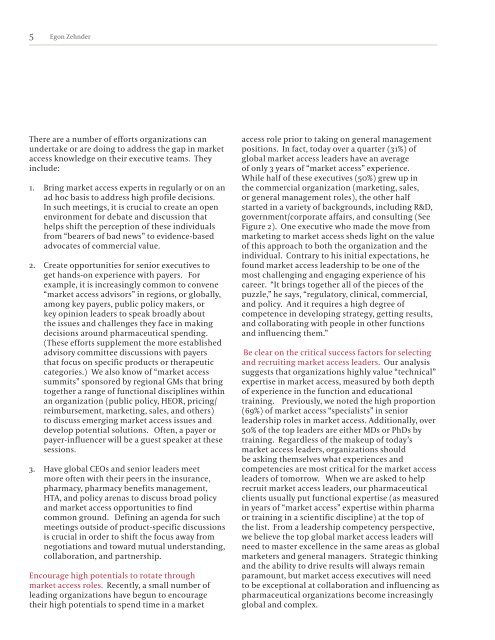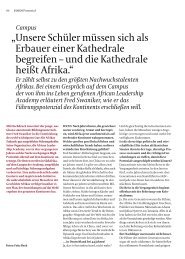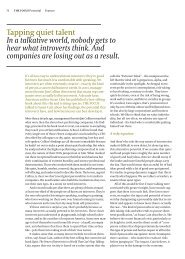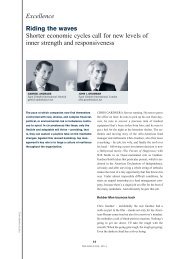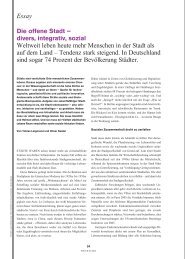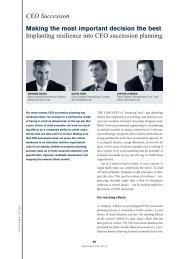managing talent to meet pharma's next great challenge: global ...
managing talent to meet pharma's next great challenge: global ...
managing talent to meet pharma's next great challenge: global ...
Create successful ePaper yourself
Turn your PDF publications into a flip-book with our unique Google optimized e-Paper software.
5 Egon Zehnder<br />
There are a number of efforts organizations can<br />
undertake or are doing <strong>to</strong> address the gap in market<br />
access knowledge on their executive teams. They<br />
include:<br />
1. Bring market access experts in regularly or on an<br />
ad hoc basis <strong>to</strong> address high profile decisions.<br />
In such <strong>meet</strong>ings, it is crucial <strong>to</strong> create an open<br />
environment for debate and discussion that<br />
helps shift the perception of these individuals<br />
from “bearers of bad news” <strong>to</strong> evidence-based<br />
advocates of commercial value.<br />
2. Create opportunities for senior executives <strong>to</strong><br />
get hands-on experience with payers. For<br />
example, it is increasingly common <strong>to</strong> convene<br />
“market access advisors” in regions, or <strong>global</strong>ly,<br />
among key payers, public policy makers, or<br />
key opinion leaders <strong>to</strong> speak broadly about<br />
the issues and <strong>challenge</strong>s they face in making<br />
decisions around pharmaceutical spending.<br />
(These efforts supplement the more established<br />
advisory committee discussions with payers<br />
that focus on specific products or therapeutic<br />
categories.) We also know of “market access<br />
summits” sponsored by regional GMs that bring<br />
<strong>to</strong>gether a range of functional disciplines within<br />
an organization (public policy, HEOR, pricing/<br />
reimbursement, marketing, sales, and others)<br />
<strong>to</strong> discuss emerging market access issues and<br />
develop potential solutions. Often, a payer or<br />
payer-influencer will be a guest speaker at these<br />
sessions.<br />
3. Have <strong>global</strong> CEOs and senior leaders <strong>meet</strong><br />
more often with their peers in the insurance,<br />
pharmacy, pharmacy benefits management,<br />
HTA, and policy arenas <strong>to</strong> discuss broad policy<br />
and market access opportunities <strong>to</strong> find<br />
common ground. Defining an agenda for such<br />
<strong>meet</strong>ings outside of product-specific discussions<br />
is crucial in order <strong>to</strong> shift the focus away from<br />
negotiations and <strong>to</strong>ward mutual understanding,<br />
collaboration, and partnership.<br />
Encourage high potentials <strong>to</strong> rotate through<br />
market access roles. Recently, a small number of<br />
leading organizations have begun <strong>to</strong> encourage<br />
their high potentials <strong>to</strong> spend time in a market<br />
access role prior <strong>to</strong> taking on general management<br />
positions. In fact, <strong>to</strong>day over a quarter (31%) of<br />
<strong>global</strong> market access leaders have an average<br />
of only 3 years of “market access” experience.<br />
While half of these executives (50%) grew up in<br />
the commercial organization (marketing, sales,<br />
or general management roles), the other half<br />
started in a variety of backgrounds, including R&D,<br />
government/corporate affairs, and consulting (See<br />
Figure 2). One executive who made the move from<br />
marketing <strong>to</strong> market access sheds light on the value<br />
of this approach <strong>to</strong> both the organization and the<br />
individual. Contrary <strong>to</strong> his initial expectations, he<br />
found market access leadership <strong>to</strong> be one of the<br />
most challenging and engaging experience of his<br />
career. “It brings <strong>to</strong>gether all of the pieces of the<br />
puzzle,” he says, “regula<strong>to</strong>ry, clinical, commercial,<br />
and policy. And it requires a high degree of<br />
competence in developing strategy, getting results,<br />
and collaborating with people in other functions<br />
and influencing them.”<br />
Be clear on the critical success fac<strong>to</strong>rs for selecting<br />
and recruiting market access leaders. Our analysis<br />
suggests that organizations highly value “technical”<br />
expertise in market access, measured by both depth<br />
of experience in the function and educational<br />
training. Previously, we noted the high proportion<br />
(69%) of market access “specialists” in senior<br />
leadership roles in market access. Additionally, over<br />
50% of the <strong>to</strong>p leaders are either MDs or PhDs by<br />
training. Regardless of the makeup of <strong>to</strong>day’s<br />
market access leaders, organizations should<br />
be asking themselves what experiences and<br />
competencies are most critical for the market access<br />
leaders of <strong>to</strong>morrow. When we are asked <strong>to</strong> help<br />
recruit market access leaders, our pharmaceutical<br />
clients usually put functional expertise (as measured<br />
in years of “market access” expertise within pharma<br />
or training in a scientific discipline) at the <strong>to</strong>p of<br />
the list. From a leadership competency perspective,<br />
we believe the <strong>to</strong>p <strong>global</strong> market access leaders will<br />
need <strong>to</strong> master excellence in the same areas as <strong>global</strong><br />
marketers and general managers. Strategic thinking<br />
and the ability <strong>to</strong> drive results will always remain<br />
paramount, but market access executives will need<br />
<strong>to</strong> be exceptional at collaboration and influencing as<br />
pharmaceutical organizations become increasingly<br />
<strong>global</strong> and complex.


